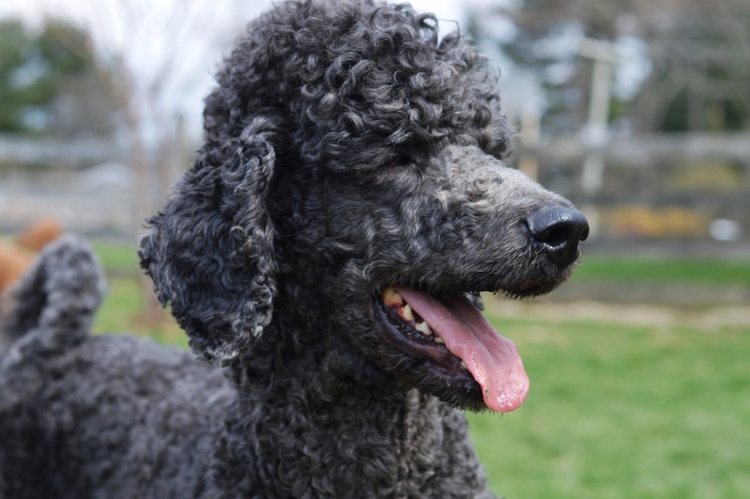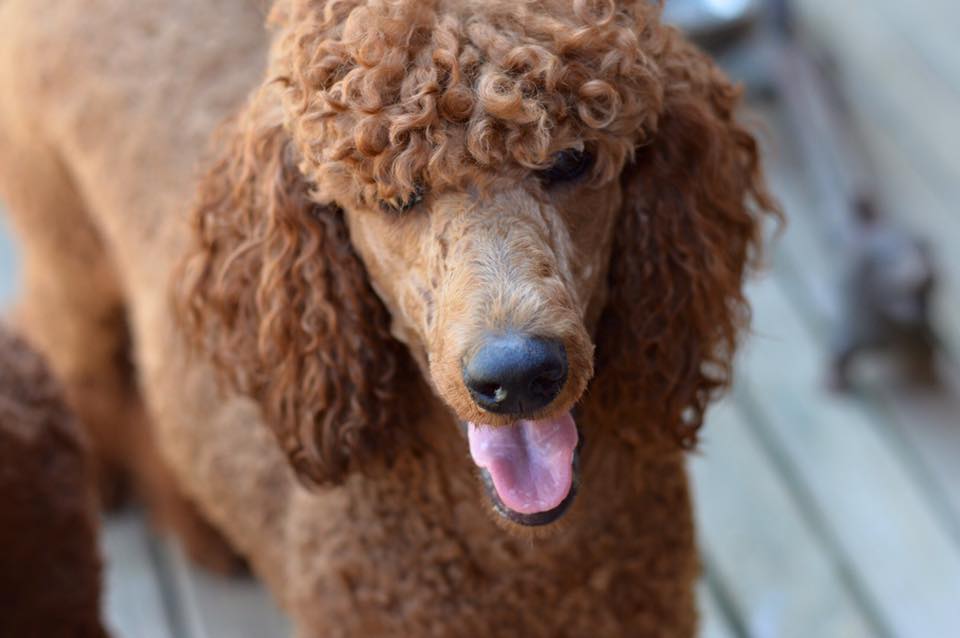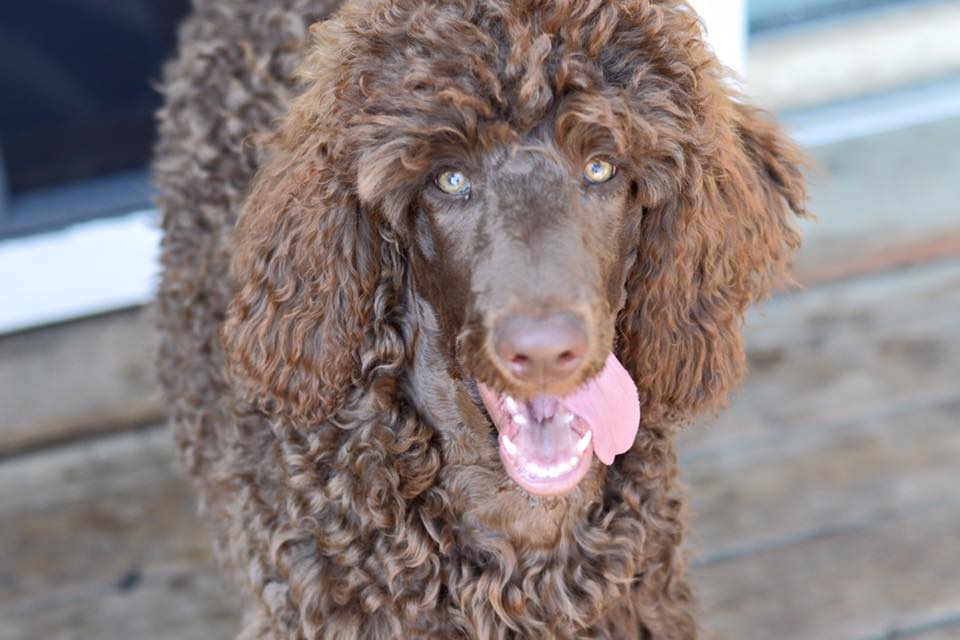About The Breeder
When my elder Lab Hattie passed away, I knew I wanted to bring another dog into our family, but I wasn't sure where to begin. While visiting a friend, I met my first Standard Poodle and began to do a bunch of research. I was convinced! I found Winston shortly there after and he was the sweetest dog I had ever met!
My Husband Rick, who is not typically a dog lover, was so impressed with Winston that he decided we needed to bring another Standard into our family! Cue Miss Eva! And that is where my interest in breeding began. These Standards were simply the best dogs we had ever owned!
I knew that if I were to start breeding I would want to do it in the best way possible and to serve both the wonderful dogs and their future families well. I love the breed and want to make sure the best possible puppies end up with the best possible families - I want to know our puppies will end up in homes which will love, adore, care for and celebrate these wonderful creatures as much or more than we do.
From the hours of TLC and training given to them to our fine-tuned application process we take the time to invest in puppy and parent-to-be.
If you have any questions about our breeding practices, training, the breed itself or anything else, please don't hesitate to reach out to me!
Meet the parents
Standard Poodle: FAQ
Frequently Asked Questions:
Do you have questions? We reccomend you check out these resources! If you anymore questions about our philosophy here at Piper's Standard Poodles, or about the breed feel free to reach out to us at:
Rachael@PipersStandardPoodles.com
The standard poodle originally came from the early German retrievers, which came to be called pudels, taken from an old German word puddler which means "to splash in or into water." The French name for the poodle is Caniche, which comes from the word canard meaning "duck" making the poodle the "duck dog." Poodles are known for their ability to retrieve downed ducks or geese for hunters. Even the original hair cut for poodles came from the hunters who designed it to keep the poodles upper body organs and joints warm, while shaving the hind area for speed in the water. While most hunting dogs lived outside in kennels, the poodles were kept in the house because they make such wonderful companions.
Gradually, poodles came to be treasured by more than hunters and their families. Their intelligence, appearance, and other pet qualities made them popular with the wealthy Europeans and even royalty. Today, poodles are clever performers, competitive in agility, therapy dogs, and loving companions to the people who own them. Poodles are quick to learn and desire to please their owners. They are very human–like and demand attention. They love to socialize and be with the family. They are very athletic and need an outlet for their abundant energy and intelligence. The poodle’s curly coat is beautiful and soft, but requires regular maintenance. Brushing is a must, at least once a week, and the coat must also be clipped approximately every two months.
Should you get a poodle?
If you are an extremely busy person who is almost never home, a poodle is not for you. Poodles want companionship, and they need lots of affection. Their intelligence needs to be challenged with training. The poodle also needs weekly coat care which is time consuming. On the other hand, if what you are looking for is a great companion that’s easy to train and fun to take for walks, on hikes, swimming, boating, or just about anywhere, the poodle is for you. Another positive of poodles is they are nonshedding and have cheerful personalities that adapt to just about any life style. They love to run and play with children, yet, they also adapt well as a companion for a retiree.Stahlkuppe, Joe. Poodles. New York: Barron's Educational Series, Inc., 1997.
So you've done your research and decided on a Standard Poodle. You've asked many questions and seen how the puppies are raised, you've met the breeder and the parents of the puppies and you're ready to make your choice. Your pick should be based on a matching personality with the puppy in question. How does the puppy react to you and your family, and kids? The sex of the puppy should be your last consideration. Why?
Most people have a huge misconception on sexes and personalities. Most feel a female is a sweet, loving dog who is a caretaker of puppies and children. Well, that's not always so--they aren't called bit** for nothing! Female dogs are nice; I like my girls and I'm pretty sure they like me. They come to me and get attention, and then they move away and are content to lie on the other side of the room. Perhaps this matches your personality perfectly--maybe you want a dog that isn't overly affectionate. Girls take training seriously, and most are very good at obedience. Females can be alpha dogs just as easily as a male can. Spayed females, of course, make a much better family pet than unspayed females do. Boys tend to get a bad rap because, in your mind, you remember the neighbor's disgusting unaltered male dog lifting his leg on every bush in the neighborhood and doing nasty "boy" things. Male dogs that are intended to be family pets NEED to be neutered at an early age (5 months old). When you do YOUR part, you have an absolutely wonderful family member. They usually squat to piddle, never develop any type of nasty habit and are extremely loving dogs. Where your girls will get their attention and go lie down, a boy will stay near you. He likes to be with his person, he likes to be loved on; he is "devoted" to you. Yes, he takes his training seriously. But then he likes to have FUN, he likes to play in the yard--he doesn't like to take life too seriously all the time! So before you choose a dog based on its sex only, consider the other elements.
Are you the type of person who likes an independent dog, or one who prefers a dog that worships the ground you walk on? Of course there is the exception to every rule and the amount of time you spend with your puppy will make a huge difference in his or her personality. My suggestion is to spend time with your potential choice at the breeder's, but don't ignore a potential 'perfect match' for you because it may not be the sex you originally sought!
So you want to add a new dog to your family? You've decided that you want a puppy, and you have a particular breed in mind. Everyone you know has told you horror stories about pet stores, so you cross them off your list. You need to select a breeder, but you don't know how to narrow your search. You don't need a fancy show dog or a high-performance hunting dog. You just want a pet. You want a companion who will fit into your lifestyle without being emotionally and financially burdensome. In simplest terms, you want a physically and mentally sound animal - a healthy, happy dog with which to share your life.
Consider that this is a decision that will be with you for the next dozen or more years. Choose wisely. Not all breeders are created equal, and neither are the puppies they produce. Keep in mind that, by definition, anyone who owns a female dog at the time it gives birth is a "breeder." It is not always easy to tell the difference between a good breeder - a responsible hobby breeder - from an unknowledgeable "backyard breeder" or a commercial "puppy mill" breeder. Things to look for as you search for your breeder:
How long has the breeder been involved in this particular breed?
If it is a breed that has recently become popular, beware of someone who has jumped on the bandwagon to make a fast buck. They may not have the best interests of the breed nor buyer in mind. The person with the slickest web page is not necessarily the best breeder!
Does the breeder produce animals markedly different from the typical examples of the breed?
Beware of non-standard deviations from a breed being marketed as "rare" to justify exorbitant prices. Non-standard variations of purebred dogs (eg., white Dobermans, longhaired Whippets, miniature Dalmatians, etc.) are generally considered undesirable by legitimate breeders. Nonetheless, if you are insistent that you want a non-standard version of a pure breed, make sure you demand the same in terms of health and temperament scrutiny that you would of someone breeding conventional purebred dogs.
Along the same lines, are the animals being bred actually purebred dogs belonging to a breed recognized by some legitimate registry?
I love mutts, but there's no excuse for someone to charge hundreds of dollars to sell what is essentially a glorified mutt (eg., Cockapoo, Schnoodle, etc.). Unscrupulous breeders will claim that cross-breeds are somehow immune to the genetically-based health problems of their purebred brethren. This is not true. Again, if you are insistent that you want a cross-breed, make sure you demand the same of the breeder that you would of someone breeding purebred dogs.
How knowledgeable is the breeder about this particular breed?
Are they familiar with its historical origins? Can they educate you about the breed's disadvantages - especially genetic predisposition to health problems and characteristics like shedding, slobber, dominance, inter-dog aggression, etc. that may make owning the breed a challenge? Beware of anyone who sounds like a salesman and tells you that their breed has no disadvantages! Good breeders will play devil's advocate.
Does the breeder show their dogs in conformation, obedience, agility, schutzhund, field work, etc. to prove their dogs' quality as breeding stock? Can they demonstrate their dogs' abilities to you?
Frankly, I do not believe that this is a requirement for one to be a good pet dog breeder, but those who actively compete in dog events tend to have an overall higher commitment to the breed. Still, don't be fooled by titles, per se. A pedigree full of conformation "champions" has absolutely zero relevance to someone seeking a healthy, happy pet.
Is the breeder "kennel blind" (believing that their dogs are perfect) or can they tell you the strengths and weaknesses of their particular dogs?
What is their goal in breeding? Is their goal consistent with your vision of an ideal pet? If they are breeding for "health and temperament," have them explain exactly what they mean. Their idea of ideal temperament and yours may differ dramatically. If their goal is to produce their next show dog, have them explain how that will translate into a good pet for you. Ear-set and tail carriage mean nothing if the dog they produces bites your children or dies of cancer before his fifth birthday.
Are the breeder's dogs screened for genetic health defects like
hip dysplasia, eye disorders, hypothyroidism, Von Willebrand's disease, epilepsy, cardiac conditions, and anything else that is common in the breed? Can they provide you with proof, e.g., CERF and OFA certification and other relevant veterinary documentation? A good breeder will welcome your concern and be glad to offer the requested information - beware of anyone who is defensive! An excellent breeder will candidly discuss the health of their line of dogs, including the problems that have cropped up. Even good breeders can produce unhealthy dogs on occasion. The difference is that the good breeder is on a mission to find and remove those genetic influences from their breeding lines. The irresponsible breeder approaches health in a haphazard manner.
Does the breeder have any old dogs on the premises?
How long have their own dogs lived, and from what have they died? Beware of the person who sells off their adult dogs that are retired from showing and breeding. You want a breeder who loves the breed, not someone who loves to breed.
How many breeds is this person breeding?
Ideally, someone will have a special interest in only one breed (perhaps two). A Jack-of-all-Breeds truly is a master of none. How many litters does the breeder have in any given year? A good breeder may breed one or two litters, or may not breed at all for a year or more between litters. More is never better. Anyone who is producing a large number of dogs is probably doing it at the expense of quality.
Are the breeder's dogs kennel dogs or house pets?
While it is sanitary to keep large numbers of dogs outside in a kennel, you want a breeder who keeps their dogs in the house with the family. Breeders who keep their dogs in kennels may have temperament defects (like excessive dominance) of which they are not even aware. Puppies should be raised inside an active home to begin socializing them to a household environment.
Will the breeder provide you with the names of their veterinarian and several past purchasers to serve as references?
If given a choice, request pet references. Certainly a professional trainer will be able to handle a tough puppy, but what about a family with three kids and a cat? If the latter just loves the temperament of their dog, that speaks volumes. Ask the breeder about the homes that haven't worked out. There are bound to be some. Is the breeder honest that they made a poor placement, sympathetic to someone who underwent a life change that necessitated returning a dog, blunt that they produced a problem dog... or is the breeder bitter and accusatory about the person who bought the dog? Beware of the narrow-minded breeder who places blame on everyone but themselves.
What kind of guarantees does the breeder offer?
Most will offer a replacement puppy or refund of purchase price if your puppy manifests a serious genetic defect. Any responsible breeder will want to keep in touch with you and be informed if your dog develops health problems. The better ones may ask you to have your pet OFA and/or CERF screened when it is old enough (as your dog reflects on their breeding stock). Truly caring breeders will insist that you return your puppy to them if you are unable to keep it for any reason during its entire life.
Does the breeder expect to sell you a puppy with strings attached?
Concerned, responsible breeders will insist that you neuter your pet puppy as soon as it is old enough. They may have you sign a contract to this effect, or they may sell the puppy with limited registration (which means that if you do breed it, you cannot register the offspring). Remarkable breeders will pediatrically neuter puppies before sending them off to their new homes. This is a very good sign in a breeder, so much so that I would be suspicious of any breeder who does not insist on neutering.
On the other hand, beware of any breeder who tries to sucker you into a breeding contract.
They will treat you like you're stupid by flattering you and trying to con you into agreeing to keep your pet intact and breeding one or more litters, giving the breeder back one or more puppies from each litter. This is the biggest scam around. You get stuck with the expense and inconvenience (not to mention health risks) of keeping an intact animal and then providing the breeder with free puppies. If a breeder tries to talk you into this kind of pyramid scheme, find another breeder.
At what age does the breeder send puppies to their new homes?
Avoid any breeder who wants to send home a puppy younger than seven weeks. Many good breeders will release puppies at 8 weeks, but as long as the puppy is being actively socialized, it is arguably better to wait until 10 or 12 weeks.
What does the breeder do to socialize their puppies?
Ask them for specifics. Good breeders will have lots of toys and activities to which to expose their puppies. Mild stress is excellent for making puppies resilient later in life. A breeder who allows their puppies to experience different sounds, surfaces, etc. and meet different people is trying hard. A breeder who keeps their puppies in some sort of ultra-sanitary, almost sterile vacuum is doing the puppies a great disservice. Puppies raised in a kennel should be avoided.
A good breeder will be very interested in who you are and somewhat choosy about whether you are able to provide an adequate home for one of their cherished pups.
A breeder who wants to see your home, your kids, your spouse, your other pets, proof of your fencing, or talk to your veterinarian is simply trying to make sure that you will take good care of their pup. Do not resent this. Good breeders want to keep in touch with you after you've purchased a puppy and will be there for you with support and advice later on. Avoid breeders who take credit card orders over the internet and ship puppies to anyone who wants them. NO responsible breeder will sell a puppy to a pet store or other broker for resale.
A good breeder will participate in breed rescue efforts for the breed they love.
This is important. Anyone who scoffs at breed rescue or is not personally involved in it in any way is someone to be avoided. Often the best place to begin your search for a good breeder is to ask breed rescue volunteers for their recommendations.
Good breeders think ahead and make reservations in advance for the puppies they will produce.
You may have to wait for a puppy, but that's not a bad thing. Beware of someone who first creates puppies and then worries about how to disperse them.
What does the breeder do for a living?
Dog breeding should be an avocation. Avoid anyone who makes their living through breeding dogs! The corners they cut financially may be at your expense.
Are the premises clean and orderly?
Are the breeder's dogs healthy in appearance? It can be a messy proposition to raise a litter of puppies, but puppies should not be wallowing in waste, covered with fleas, or otherwise appear neglected. Keep in mind that many longhaired bitches will shed their coats heavily during this time, so if the puppies' mother appears a little ratty it is not necessarily inappropriate or unusual.
Do you like the temperaments of the puppies' parents?
Remember, temperament is genetic! Avoid puppies from bitches that demonstrate any aggression or shyness. Specifically inquire about possessiveness (food and object guarding), inter-dog aggression, defensiveness about being handled, etc. Accept no excuses for undesirable behavior. Don't be afraid to ask the breeder to demonstrate the bitch's good temperament to you.
Has the breeder or will the breeder allow you to temperament test the litter?
While puppy-testing is not especially predictive of adult temperament, it's an attempt to gauge a puppy's personality so that it can be best matched with a new owner. Ask the breeder's permission before doing anything to a puppy. No potential buyer has the right to do anything to a puppy which a breeder perceives as potentially harmful.
Does your breeder respect veterinarians, trainers, groomers, breeders, and other peer professionals in the dog world?
Beware of breeders who are paranoid or hostile towards other professionals. One cannot operate competently in a vacuum, and in general, good breeders are socially well-networked. They are liked, like others, and respect competent professionals in their field. A good breeder should make the effort the know other good breeders (especially of their own breed). It is important for a breeder to strive to improve their knowledge and understanding of their breed and submit to peer critique, even if it is not necessarily formalized (as in the show ring).
Beware of fads and people who ascribe to them.
Some people feed their dogs a diet of raw meat and bones and avoid vaccinating their animals, for example. These people strongly believe that commercial kibble and routine vaccinations create immune system defects and compromised health in pet dogs. Perhaps that's true for their dogs, in which case they should not be breeding those animals. Find a breeder who feeds a good quality commercial kibble and provides standard veterinary care, including appropriate vaccinations, heartworm preventatives, etc.
Often overlooked, but important - do you like the breeder?
Will you feel comfortable relying on this person as a resource to help you if you ever run into problems with your pup? If you feel that the breeder is abrasive, rude, ignorant, or otherwise disagreeable, look elsewhere to buy your puppy. One of the greatest advantages of buying from a breeder is the support and assistance they can offer you throughout your dogs life.
Evaluating a Pet Dog Breeder Author: Kate Connick ©2001
[ Open All | Close All ]
Want to Support Us? We are an Amazon Affiliate Partner!
“We are a participant in the Amazon Services LLC Associates Program, an affiliate advertising program designed to provide a means for us to earn fees by linking to Amazon.com and affiliated sites.”





